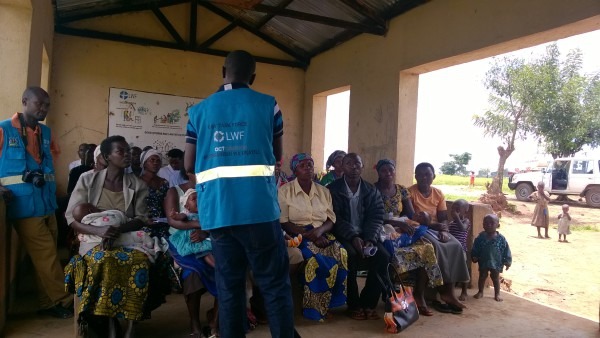The Population and Sustainability Network is proud to announce that it is helping Network member, the Thohoyandou Victim Empowerment Programme, provide family planning information to refugees from the Democratic Republic of Congo.
UNHCR estimates show that there are currently around 250,000 refugees from the Democratic Republic of Congo (DRC) in Uganda. Around 60,000 live in the Rwamwanja refugee settlement, where a large proportion of women are rape survivors. For many of these women, escaping sexual violence as a weapon of war in the DRC is not the end of their ordeal, as levels of this form of violence in the settlement itself remain high. As a result, the Thohoyandou Victim Empowerment Programme (TVEP) and the Population Council-led Africa Regional SGBV Network is providing technical assistance in Rwamwanja for the implementation of its model programme designed to combat violence against women.
Chi-Chi Undie of the Population Council explained, “The Population Council has supported TVEP’s work in combatting violence against women in rural South Africa for many years, including assessments of this work to strengthen the evidence-base on effective SGBV responses. We believe TVEP’s approach will be beneficial for persons of concern in the refugee settlement of Rwamwanja, and we look forward to assessing the actual effects of this work. It’s hard to think of somewhere with greater need.”
TVEP are providing training to Uganda’s Lutheran World Federation (LWF) so LWF can implement an adapted version of TVEP’s “Zero Tolerance Village Alliance” programme. The four thematic areas of this programme are combatting sexual assault, child abuse, HIV stigma and domestic violence. Programme activities include empowering community members with educational activities on their rights and responsibilities in these areas, interventions leading to community-wide attitudes of “zero tolerance” towards these social crimes and actions to increase women’s agency. Evidence shows that implementation of TVEP’s model in other settings had led to enhanced knowledge among community members of where to obtain post-rape care services, and to a change in negative gender beliefs.
Fiona Nicholson, TVEP Programme Director said, “TVEP joined the Population and Sustainability Network as we wanted to develop our work to have an additional focus on voluntary family planning. When we arrived in Rwamwanja we realised this project required that input.” From a family planning perspective, there are two primary issues needing urgent attention in Rwamwanja. Many of the refugees, having lost their entire families in the process of escaping the DRC, are keen to have large families but lack information on healthy timing and spacing of pregnancy. Additionally, with such high rape prevalence, it is important that women have access to emergency contraception at Rwamwanja’s health centres. David Johnson, PSN Chief Executive said, “We’re already working with TVEP at a South African site, where we are providing the community information, education and communication materials and training on healthy timing and spacing of pregnancy, and we were only too happy adapt those materials for this different setting and add a greater focus on emergency contraception options.”
PSN is the international programme of the Margaret Pyke Trust, the UK’s leading provider of sexual and reproductive health (SRH) training for healthcare professionals, and so has contacts with hundreds of specialist SRH professionals. We are exploring possibilities for these SRH medical practitioners to volunteer to plug any gaps at Rwamwanja.
The global refugee crisis is currently gaining a great deal of coverage, but the focus is mainly on refugees seeking sanctuary in Europe. All the organisations involved at Rwamwanja are all too aware that the crisis is in no way restricted to Europe and that the sexual and reproductive rights of all refugees must never be forgotten.
Press release from Population and Sustainability Network and Thohoyandou Victim Empowerment Programme (TVEP)
The views and opinions expressed through the MAHB Website are those of the contributing authors and do not necessarily reflect an official position of the MAHB. The MAHB aims to share a range of perspectives and welcomes the discussions that they prompt.
